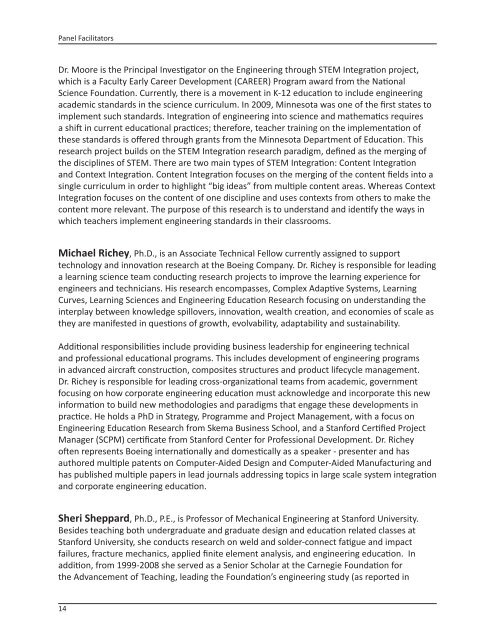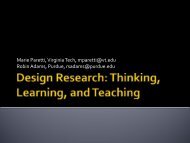2012 Conference Program - Virginia Tech Engineering ...
2012 Conference Program - Virginia Tech Engineering ...
2012 Conference Program - Virginia Tech Engineering ...
Create successful ePaper yourself
Turn your PDF publications into a flip-book with our unique Google optimized e-Paper software.
Panel FacilitatorsDr. Moore is the Principal Investigator on the <strong>Engineering</strong> through STEM Integration project,which is a Faculty Early Career Development (CAREER) <strong>Program</strong> award from the NationalScience Foundation. Currently, there is a movement in K-12 education to include engineeringacademic standards in the science curriculum. In 2009, Minnesota was one of the first states toimplement such standards. Integration of engineering into science and mathematics requiresa shift in current educational practices; therefore, teacher training on the implementation ofthese standards is offered through grants from the Minnesota Department of Education. Thisresearch project builds on the STEM Integration research paradigm, defined as the merging ofthe disciplines of STEM. There are two main types of STEM Integration: Content Integrationand Context Integration. Content Integration focuses on the merging of the content fields into asingle curriculum in order to highlight “big ideas” from multiple content areas. Whereas ContextIntegration focuses on the content of one discipline and uses contexts from others to make thecontent more relevant. The purpose of this research is to understand and identify the ways inwhich teachers implement engineering standards in their classrooms.Michael Richey, Ph.D., is an Associate <strong>Tech</strong>nical Fellow currently assigned to supporttechnology and innovation research at the Boeing Company. Dr. Richey is responsible for leadinga learning science team conducting research projects to improve the learning experience forengineers and technicians. His research encompasses, Complex Adaptive Systems, LearningCurves, Learning Sciences and <strong>Engineering</strong> Education Research focusing on understanding theinterplay between knowledge spillovers, innovation, wealth creation, and economies of scale asthey are manifested in questions of growth, evolvability, adaptability and sustainability.Additional responsibilities include providing business leadership for engineering technicaland professional educational programs. This includes development of engineering programsin advanced aircraft construction, composites structures and product lifecycle management.Dr. Richey is responsible for leading cross-organizational teams from academic, governmentfocusing on how corporate engineering education must acknowledge and incorporate this newinformation to build new methodologies and paradigms that engage these developments inpractice. He holds a PhD in Strategy, <strong>Program</strong>me and Project Management, with a focus on<strong>Engineering</strong> Education Research from Skema Business School, and a Stanford Certified ProjectManager (SCPM) certificate from Stanford Center for Professional Development. Dr. Richeyoften represents Boeing internationally and domestically as a speaker - presenter and hasauthored multiple patents on Computer-Aided Design and Computer-Aided Manufacturing andhas published multiple papers in lead journals addressing topics in large scale system integrationand corporate engineering education.Sheri Sheppard, Ph.D., P.E., is Professor of Mechanical <strong>Engineering</strong> at Stanford University.Besides teaching both undergraduate and graduate design and education related classes atStanford University, she conducts research on weld and solder-connect fatigue and impactfailures, fracture mechanics, applied finite element analysis, and engineering education. Inaddition, from 1999-2008 she served as a Senior Scholar at the Carnegie Foundation forthe Advancement of Teaching, leading the Foundation’s engineering study (as reported in14



